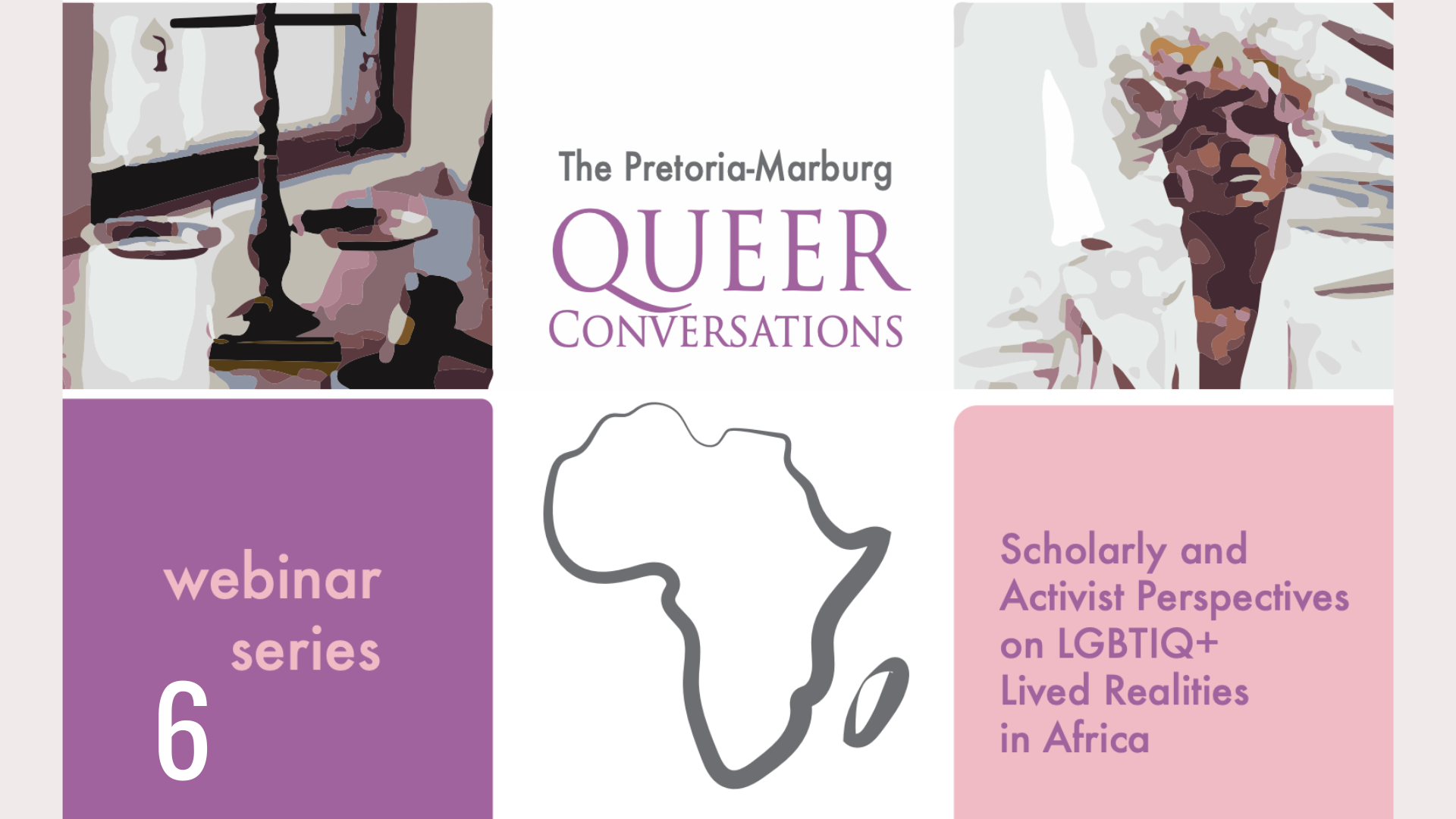On 8 September 2022 the Center for Gender Studies and Feminist Futures (CGS) and the Center for Conflict Studies (CCS) at the University of Marburg hosted the final session of the webinar series in the Pretoria-Marburg Queer Conversations: Scholarly and Activist Perspectives on LGBTIQ+ Lived Realities in Africa in collaboration with the Centre for Sexualities, AIDS, and Gender (CSA&G), and the Centre for Human Rights (CHR) at the University of Pretoria. The Pretoria-Marburg Queer Conversations creates a monthly space for in-depth discussions designed to tap into the intersections of knowledge-production and transfer between diverse scholarly and activist spheres and contributes to methodological, conceptual, and normative aspects of centering LGBTIQ+ rights and lived realities in African contexts.
Dr Mariel Reiss from the CGS and CCS facilitated the discussion of the sixth session titled “Prospects and Challenges for Transnational Activism to Advance LGBTIQ+ Rights in Africa”. The first panelist Njeri Gateru is a queer feminist human rights lawyer with twelve years experience working on the protection of minorities in Kenya including asylum seekers, internally displaced persons and LGBTIQ+ communities. She is founding member and the Executive Director of the National Gay and Lesbian Human Rights Commission in Kenya. The second panelist is Keval Harie, the Director of the Gay and Lesbian Memory in Action (GALA) based at the University of Witwatersrand, Johannesburg in South Africa. In the role as director, Keval is committed to growing GALA into a centre for research and advocacy for the equality, freedom and justice for lesbian, gay, bisexual, trans and intersex people. Keval is a qualified attorney and completed his articles at Edward Nathan Sonneburgs (ENS Africa).
During the session, Njeri Gateru explored the benefits of cross-border collaboration in strategic litigation to promote LGBTIQ+ rights. Even though the implementation of laws usually only has an impact within a given country, the learnings from each other are very valuable as many African states share the same legal landscape. This is due to the fact that these states have a similar colonial history, which contributes to shaping their legal system. Challenges related to advocacy for LGBTIQ+ rights are also similar across the continent. Among these is a more professional and better resourced opposition that seeks to eradicate the achievements that have been made so far. In addition, many organisations face the challenge of not only having insufficient financial but also non-financial resources to carry out their work. This affects the capacity of NGOs and could have an impact on the mental health of activists involved, as their resources are overstretched.
Despite progressive regulations for LGBTIQ+ rights in some states, such as South Africa, violence against LGBTIQ+ persons still occurs, showing that practices related to the protection and safety of the LGBTIQ+ community do not go far enough. The negligence of the safety of LGBTIQ+ individuals is also reflected in the extractive approach of many research projects, which put the interest of the researchers at the center of their work. Furthermore, LGBTIQ+ movements are very much co-opted, which can lead to them receiving less funding than other movements that have managed to work together transnationally and even globally. One of the common threads in the work of activists across the continent is to challenge the narrative that homosexuality is un-African. This is also one of the focal points of GALA's work, which focuses on exposing queer history and challenging this narrative.
Njeri Gateru and Keval Harie continued by exploring the prospects for LGBTIQ+ rights work in Africa. Despite the backlash, activists in LGBTIQ+ movements are finding ways to use the rigid systems to their advantage. In addition to strategic litigation, it is also important to talk about strategic communication, which is about learning ways to best present things in order to change people's minds. Moreover, there is a need for more interdisciplinary collaboration in advocacy. An example of this is the relevance of empirically based data produced by scholars to support arguments in court. Keval Harie further explained that especially in archiving lived realities, trust is an important factor in working with communities who are willing to share their experiences. Scholars and researchers interested in exploring such data should be aware of the importance of this trust and should not carry out extractive research. Transnational cooperation has also shown that given the similarities of many African countries, it is important to learn from and support each other and create spaces of solidarity. Furthermore, international organisations and institutions such as the United Nations also play an important role in promoting LGBTIQ+ rights on the continent. Despite all the difficulties within the movements, activists should not forget to create a space of solidarity and joy and to celebrate the history of queer Africa and show this to the world.
The Pretoria-Marburg Queer Conversations will continue next year.
For more information, contact:
Dr Justice Medzani
Centre for Sexualities, Aids, and Gender
University of Pretoria
justice.medzani@up.ac.za
Dr Ayodele Sogunro
Centre for Human Rights
University of Pretoria
ayodele.sogunro@up.ac.za
Dr Mariel Reiss
Center for Conflict Studies
Philipps-University of Marburg
mariel.reiss@uni-marburg.de


